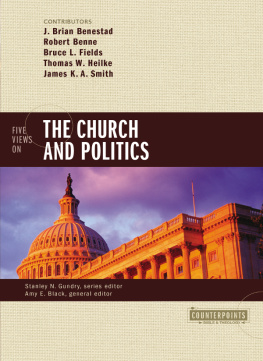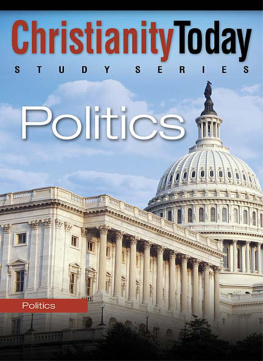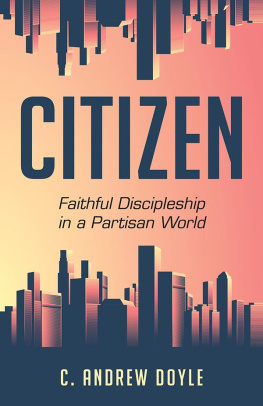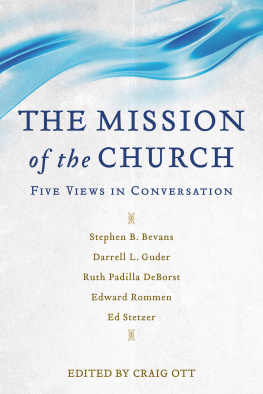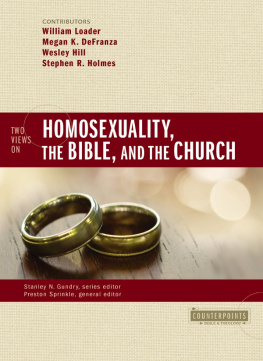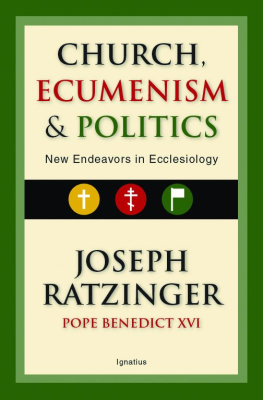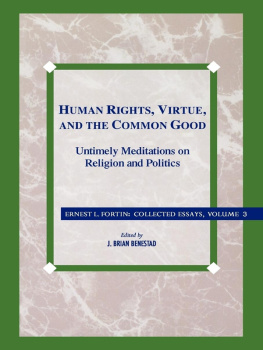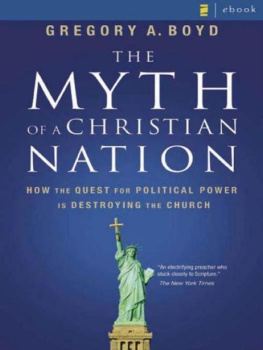Books in the Counterpoints Series
Church Life
Evaluating the Church Growth Movement
Exploring the Worship Spectrum
Remarriage after Divorce in Todays Church
Understanding Four Views on Baptism
Understanding Four Views on the Lords Supper
Who Runs the Church?
Bible and Theology
Are Miraculous Gifts for Today?
Five Views on Apologetics
Five Views on Biblical Inerrancy
Five Views on Law and Gospel
Five Views on Sanctification
Five Views on the Church and Politics
Four Views on Christian Spirituality
Four Views on Divine Providence
Four Views on Eternal Security
Four Views on Hell
Four Views on Moving Beyond the Bible to Theology
Four Views on Salvation in a Pluralistic World
Four Views on the Apostle Paul
Four Views on the Book of Revelation
Four Views on the Historical Adam
Four Views on the Role of Works at the Final Judgment
Four Views on the Spectrum of Evangelicalism
Genesis: History, Fiction, or Neither?
How Jewish Is Christianity?
Show Them No Mercy
Three Views on Creation and Evolution
Three Views on Eastern Orthodoxy and Evangelicalism
Three Views on the Millennium and Beyond
Three Views on the New Testament Use of the Old Testament
Three Views on the Rapture
Three Views on the Doctrine of the Trinity
Two Views on Women in Ministry
ZONDERVAN
Five Views on the Church and Politics
Copyright 2015 by Amy E. Black, J. Brian Benestad, Robert Benne, Bruce Fields, Thomas W. Heilke, and James K.A. Smith
ePub Edition October 2015: ISBN 978-0-310-51793-1
Requests for information should be addressed to:
Zondervan, 3900 Sparks Drive SE, Grand Rapids, Michigan 49546
Library of Congress Cataloging-in-Publication Data
Five views on the church and politics / Thomas W. Heilke, Robert Benne, Bruce L. Fields, James K.A. Smith, J. Brian Benestad ; Amy E. Black, general editor.
pages cm. (Counterpoints: Bible and theology)
Includes bibliographical references and index.
ISBN 978-0-310-51792-4 (softcover)
1. Christianity and politics. 2. Theology, Doctrinal. I. Black, Amy E., editor.
BR115.P7F58 2015
261.7 dc23
2015030120
All Scripture quotations, unless otherwise indicated, are taken from The Holy Bible, New International Version, NIV. Copyright 1973, 1978, 1984, 2011 by Biblica, Inc. Used by permission. All rights reserved worldwide.
Scripture quotations marked ESV are taken from The Holy Bible, English Standard Version, copyright 2001 by Crossway Bibles, a division of Good News Publishers. Used by permission. All rights reserved.
Any Internet addresses (websites, blogs, etc.) and telephone numbers in this book are offered as a resource. They are not intended in any way to be or imply an endorsement by Zondervan, nor does Zondervan vouch for the content of these sites and numbers for the life of this book.
All rights reserved. No part of this publication may be reproduced, stored in a retrieval system, or transmitted in any form or by any means electronic, mechanical, photocopy, recording, or any other except for brief quotations in printed reviews, without the prior permission of the publisher.
Cover design: Tammy Johnson
Cover photography: Travel Pictures Ltd/SuperStock.com
Interior design: Kait Lamphere
15 16 17 18 19 20 21 22 23 24 25 /DCI/ 20 19 18 17 16 15 14 13 12 11 10 9 8 7 6 5 4 3 2 1
CONTENTS
Responses
Responses
Responses
Responses
Responses
C hristians throughout the centuries have asked questions about how to interact with governing authorities and the broader culture. Followers of Christ owe ultimate allegiance to God, yet they also have rights and responsibilities as earthly citizens.
The Pharisees and Herodians even tried to drag Jesus into political controversies of his day. Knowing that either answer would very likely cause him trouble, they hoped to trick Jesus into making a dangerous statement, asking, Tell us, then, what is your opinion? Is it right to pay the imperial tax to Caesar or not? (Matt. 22:17).
Unwilling to take their bait, Jesus responded with a command and a question. First, he told them to show him the coin used to pay the tax, and then he asked them whose image it bore. When they answered that the coin bore the image and inscription of Caesar, he offered this enigmatic response: So give back to Caesar what is Caesars, and to God what is Gods (Matt. 22:21). With this reply, Jesus refused to take a side in the fierce political debate of his day over the poll tax and implied that loyalty to a pagan government was not incompatible with loyalty to God.
Much as in Jesus own time, political debates today on a wide range of issues divide people, including those in the church. And Christians still debate what it means to give back to Caesar what is Caesars and to God what is Gods. Historical traditions have offered varying interpretations of the extent to which followers of Christ should engage with governing powers and what it means to be faithful citizens. Yet many Christians are unaware of how these rich traditions can guide them to think more deeply about the relationship between their faith and politics. This book introduces five of these historic traditions of Christian political thought: Anabaptist, Lutheran, Black Church, Reformed, and Catholic.
Five Traditions in Conversation
Not every theological tradition has a robust and distinctive set of teachings that we might call a political theology, but four in particular (Catholic, Reformed, Lutheran, and Anabaptist) stand out for their enduring influence on conversations about church and state over many centuries. A fifth tradition, that of the Black church, is specifically rooted in the United States and represents a distinctive theological perspective, not to mention forms of communal practice, that is too often discussed in isolation or simply ignored.
This book places these five approaches in conversation with one another, aligning them along a spectrum representing the extent of their Christian political engagement. Borrowing terms from H. Richard Niebuhrs classic Christ and Culture, the essays in this book outline five different views on church and politics.
The Christian traditions represented in this volume are rich and diverse. Although most are historically centered on the work of a particular individual or small group of thinkers, each has developed and changed over centuries. Modern Lutheran denominations, for example, draw deeply from ideas presented in Martin Luthers writing and teaching. At the same time, they have developed doctrines and practices that address situations and contexts incomprehensible in Luthers era and veer far from what Luther could have imagined. The endurance and adaptation of each of the traditions in this book, despite vastly changing political contexts, highlight their value for understanding present and future contexts, not just the past.
Each of the contributors to this volume writes from within a particular tradition and with keen awareness of its variations, strengths, and weaknesses. The authors do not intend to speak for the entirety of their traditions. Instead, they write from their own perspectives and offer insights into ways that their historical traditions inform thinking about the relationship between Christian faith and politics. Their essays and responses to one another provide a rich introduction to ways in which Christians across time and traditions have understood both the relationship between church and state and the rightful place for individual and collective political participation.
Next page
